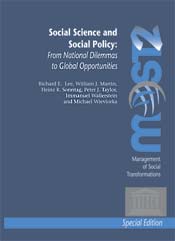|
|
 |
 |
|
 |
 |
|
 |
 |
|
 |
| Social Science and Social Policy: From National Dilemmas to Global Opportunities |
 |
|
 |
 Social science has had an ambiguous relationship with social policy throughout its history. When the term and concept of social science first began to be used in the middle of the nineteenth century, the initial organizations that emerged to promote social science were not located in the universities but in the public sphere. They brought together not only scholars but persons active in the political arena, clergymen, and business people, and the primary objective of these associations was to promote reform, that is, what they considered to be more adequate social policies to ameliorate what they designated as social problems. The social problems of which they spoke were for the most part those associated with the expanding urban centres and the newly-emerging manufacturing sector of the economy. Social science has had an ambiguous relationship with social policy throughout its history. When the term and concept of social science first began to be used in the middle of the nineteenth century, the initial organizations that emerged to promote social science were not located in the universities but in the public sphere. They brought together not only scholars but persons active in the political arena, clergymen, and business people, and the primary objective of these associations was to promote reform, that is, what they considered to be more adequate social policies to ameliorate what they designated as social problems. The social problems of which they spoke were for the most part those associated with the expanding urban centres and the newly-emerging manufacturing sector of the economy.
These associations felt that accumulating various kinds of data on these issues, usually statistical data, would illuminate the directions in which the State might proceed, by means of various new policies/reforms, to alleviate the ills that these associations perceived. This early version of institutionalized social science was essentially an activity occurring in the more industrialized states - notably the United Kingdom, France, the United States, and later Germany and Italy. Obviously, the promotion of social policy was not politically neutral, even if it was not necessarily tied to the programmes of any particular political party or movement. As the century went on, disagreements about policy caused discomfort among the membership of these associations. Some of those who were linked to the university system argued that it was more appropriate for social scientists to play a role that was primarily intellectual, and hence they called for more "value-neutral" research. The initial social science associations disappeared or changed names and were replaced by more "professional" associations, many of which have continued in existence until today.
Nonetheless, the question of the relation of social science to social policy did not entirely disappear as a consequence. It more or less went underground. Some of those who were concerned with promoting the link between the two activities began to talk of engaging in "applied" social science, as opposed to merely theorizing about social relations or merely undertaking empirical research. Others, consciously or not, intruded basic value assumptions into the analytical premises of their work, thereby excluding certain policy outcomes and implicitly supporting other outcomes. One might think of the continuing relation between social science and social policy as a sort of tumultuous marriage, in which the rules of conjugality were never fully established or agreed to by both parties.
More ... |
 |
|
|
Document Type |
MOST Policy Paper |
|
Status |
Reference Paper for the International Forum on the Social Science – Policy Nexus |
|
|
|
|
Format |
application/pdf |
|
Website (URL) |
http://unesdoc.unesco.org/images/0014/001402/140246e.pdf |
|
Author(s) |
Lee, Richard E.; Martin, William J.; Sonntag, Heinz R.; Taylor, Peter J.; Wallerstein, Immanuel |
|
|
|
|
|
|
|
Publisher |
UNESCO / MOST Programme |
|
Publication Location |
Paris, France |
|
Publication Year |
2005 |
|
Volume/Issue Number |
Special Edition |
|
Number of Pages |
28 p. |
|
|
|
|
|
|
|
|
|
|
Series Title |
MOST policy papers, new series MOST-2 |
|
|
|
|
|
|
|
|
|
|
|
|
|
 |
 |
 Email this page Email this page  Printable version Printable version
|
 |
|
|


